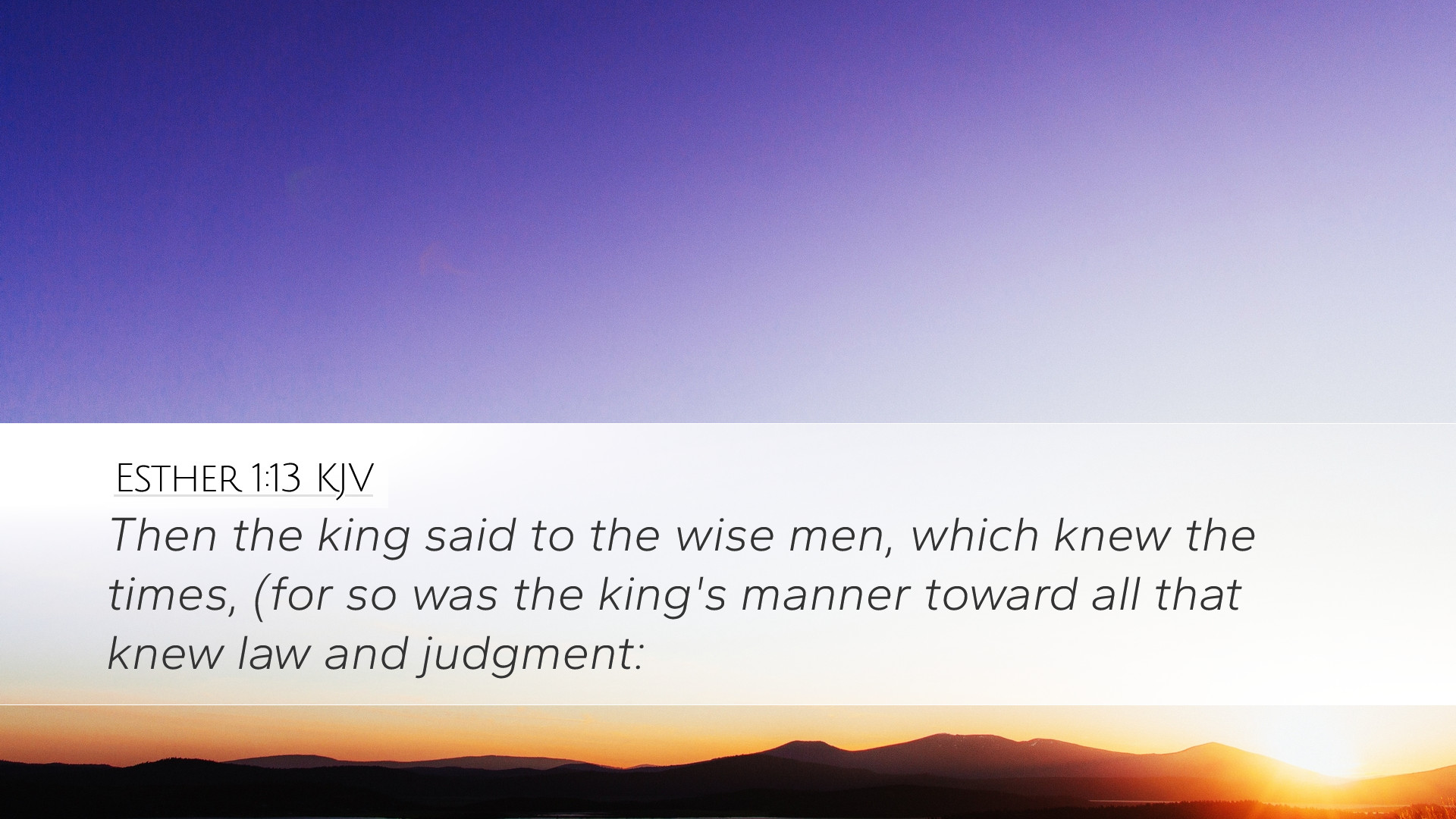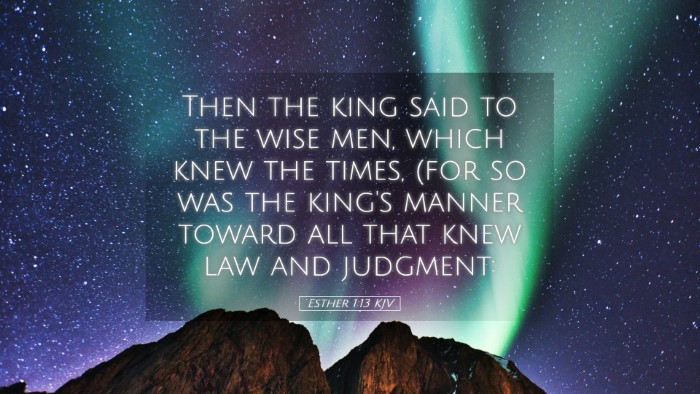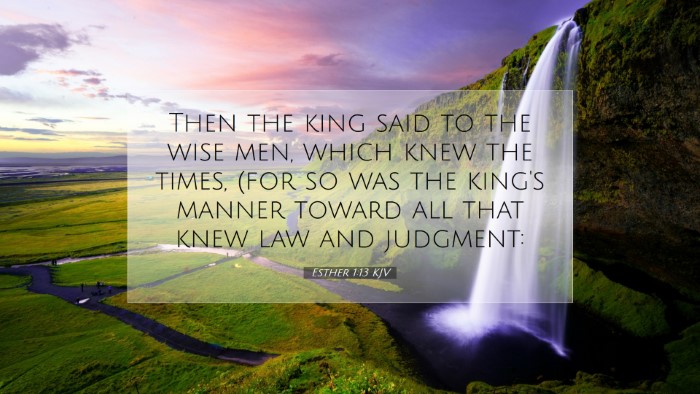Old Testament
Genesis Exodus Leviticus Numbers Deuteronomy Joshua Judges Ruth 1 Samuel 2 Samuel 1 Kings 2 Kings 1 Chronicles 2 Chronicles Ezra Nehemiah Esther Job Psalms Proverbs Ecclesiastes Song of Solomon Isaiah Jeremiah Lamentations Ezekiel Daniel Hosea Joel Amos Obadiah Jonah Micah Nahum Habakkuk Zephaniah Haggai Zechariah MalachiEsther 1:13
Esther 1:13 KJV
Then the king said to the wise men, which knew the times, (for so was the king's manner toward all that knew law and judgment:
Esther 1:13 Bible Commentary
Commentary on Esther 1:13
Esther 1:13 (ESV): "Then the king said to the wise men who knew the times, for it was the king's procedure toward all who were versed in law and judgment."
Introduction
The context of Esther 1:13 comes from a significant moment in the Book of Esther where King Ahasuerus, after an embarrassing incident involving Queen Vashti, seeks the counsel of his wise men. This verse not only depicts the king's authority and governance style but also sets the stage for the events that ultimately lead to Esther's ascendancy. The commentaries from Matthew Henry, Albert Barnes, and Adam Clarke provide depth to our understanding of this passage.
Historical Context
The historical backdrop of Esther is critical for understanding its themes and events. The Persian Empire was marked by a king's exercise of absolute power, underlining the importance of wisdom and council in decision-making. This verse illustrates the king’s reliance on his advisors, reflecting the societal norms of governance in ancient Persia.
Insights from Public Domain Commentaries
Matthew Henry's Commentary
Matthew Henry emphasizes the king’s need for wisdom and the role of his advisers. He points out that these wise men were "those that knew the times," indicating their expertise in governance and the cultural happenings of the day. Henry notes that the king's inquiry reveals his lack of personal judgment and highlights how the wise counsel was integral to Persian kingship.
Henry also discusses the implications of the king's behavior, suggesting that it illustrates a broader theme of moral and ethical dilemmas faced by rulers. The contrast between Ahasuerus's reliance on human wisdom versus divine guidance is evident, serving as a cautionary point for leadership.
Albert Barnes' Notes on the Bible
Albert Barnes provides a detailed analysis of the phrase "the wise men who knew the times." He argues that this signifies those with a keen understanding of current events and legal traditions. Barnes explains that their role was not only advisory but also corrective, serving to uphold the law and the king’s reputation.
Barnes also interprets the "king's procedure" as indicative of a structured legal system in which the king was bound to seek counsel before making decisions, highlighting the importance of process in governance. This verse suggests that even powerful figures must be accountable to established norms and legal frameworks.
Adam Clarke's Commentary
Adam Clarke expands on the cultural implications of the king’s actions. He stresses that seeking advice reflects a prudent leadership quality and a recognition of one's limitations. Clarke points out that the king’s decision-making process underscores the complexity of royal privilege; even a king could fall victim to impulsiveness without careful consideration.
Clarke also draws attention to the "wise men" and their role in shaping policy. He describes them as integral to understanding the moral framework of actions taken in the court, emphasizing that their advice was critical in maintaining the king's dignity and preserving order in the realm.
Theological Implications
Esther 1:13 opens a discussion on the relationship between divine providence and human governance. The reliance on wisdom highlights the tension between earthly authority and heavenly guidance. These commentaries collectively challenge readers to consider how human counsel can either align with or diverge from God’s purposes.
- Divine Sovereignty: The events, though initiated by human decisions, unfold under God's sovereign design. This verse meditates on the providential control God maintains over worldly matters.
- Accountability of Leadership: The necessity of seeking wise counsel is a reminder of accountability among leaders. Their choices impact not only their reign but the lives of many.
- Wisdom in Decision-Making: The care with which the king seeks guidance invites leaders today to pursue wisdom in their contexts, advocating for prayerful consideration and counsel.
Conclusion
Esther 1:13 serves as a pivotal point in the narrative of Esther, revealing the dynamics of leadership and the necessity of wisdom in governance. Through the insights of Henry, Barnes, and Clarke, we see the multifaceted nature of advice and decision-making processes. For pastors, students, and scholars, this passage is a call to engage deeply with the principles of leadership that honor God while navigating the complexities of human authority.


